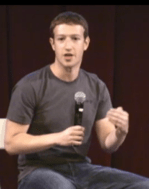
Brian Whalley
Brian Whalley is a search marketer at HubSpot, a marketing software company in Cambridge, MA. He focuses on search engines and developing strategies for how businesses can get found online. You can follow him on Twitter at @bwhalley.
Google Will Change Web Marketing in 2012
Google is poised to completely alter how websites market themselves over the next year. While easing users into changing search results pages, Google has also designed a new method for websites to structure data so that its crawler can better pull information. This is a tremendous strategy. Google doesn't need to own all of the information in the world, but does own the methods of accessing that information — as well as the ability to advertise to people who use that access.
Search results will include more direct information. Early in 2012, Google will expand how it incorporates data into its search results. For search queries that are direct questions, it will no longer be necessary to click through to a website. In Google's parlance, it's like getting both the search results and the immediate result of the "I'm Feeling Lucky" button at once. It's not hard to see how this is better for the average Google user. Questions will be answered faster and more simply. No parsing of information will be required. This change, however, will take value away from marketers who rely on visitors clicking through to deeper pages.Google is looking to collect more data by providing ways for website owners to structure their information so that it can be easily read by a computer. Google's plans revolve around metadata (literally, special data encoded in the page) that will allow it to access more rich data about a topic, including hours of business, names of products, and virtually anything else that you can think of. Marketers will see better search rankings if they document information using this new format.
Google is entering new industries and markets. The expansion of data into search results pages is also breaking into markets where Google is not yet a force. Google acquired ITA Software in 2010, a software company that created airfare and travel management software for airlines and resellers. Since then, they have worked to become a powerful competitor in the travel industry by promoting their own offers and packages directly on the search results page ahead of other providers. To see this in action, try searching for "BOS to SFO" in Google. This is a tremendous advertising presence that others cannot match.
If you're a marketer working on making sure your site is visible in an area where Google is competitive, remember that you may need to do more than an organic search or paid advertising in order to be successful. Google has created a system where people must pay in order to compete against it. Regardless of whether the information and options available to searchers are free or paid for by marketers, people will continue to use Google in overwhelming numbers as long as Google continues to have the best results for a given search.
The data that Google makes available will be reduced. Google now sees its ownership of data as a competitive advantage to be protected from marketers and other advertising networks. In the latter half of 2011, Google began to roll out changes that have taken data away from marketers, specifically about how and where visitors found their website. Since October, between 10-15% of visits to websites from Google have no longer sent information to webmasters and marketers. It is safe to assume that Google will continue to expand these changes, further limiting the data available to marketers unless they're willing to pay.
Google's activity in the second half of 2011 represents just the beginning of the changes that it will be pushing throughout 2012 as it establishes even stronger relationships with its partners, affiliates, and advertisers. While this happens, every marketer on the web will need to carefully consider and revisit how they are positioned with the search giant and its interests.
More blog posts by Brian Whalley
Required reading for all internet marketers.




























